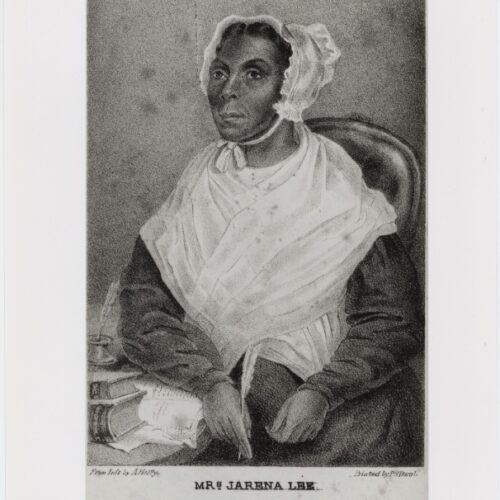Biography
Early Life
Jarena Lee became the first woman ordained to preach in the African Methodist Episcopal (AME) Church during the early nineteenth century.
Lee was born on February 11, 1783, in Cape May, New Jersey. At an early age, she began working away from home as a domestic because her family lived in poverty. It was not until she encountered the Black church that Lee was able to fulfill her destiny.
Religious Call to Action
When Lee was in her twenties, she felt called to preach and asked if she could share her message with the Bethel African Methodist Church. It was not until she returned to Philadelphia several years later, after marrying Reverend Joseph Lee in 1811, that she was bestowed the authority to preach.
She recalled the incident in her memoir Religious Experience and Journal of Mrs. Jarena Lee, Giving an Account of Her Call to Preach the Gospel (1836). During a church service, Lee “sprang, as by altogether supernatural impulse, to my feet, when I was aided from above to give an exhortation on the very text which my brother Williams had taken.”
Her spontaneous sermon was a shock to Lee and the congregation, but ultimately was a transformative experience for all present. She recounted, “I feared it might be called, I should be expelled from the church. But instead of this, the Bishop [Richard Allen] rose in the assembly, and related that I had called upon him eight years before, asking to be permitted to preach and that he had put me off; but that he now as much believed that I was called to that work, as any of the preachers present.”
Evangelism
This bode of confidence in the public proclamation from the founder of the AME church propelled Lee into a life of evangelism. She traveled throughout the North to preach, while sustained by communities of Black women involved in ministry.
Lee’s success as an ordained preacher in the AME church paved the path for other Black women to gain authority in leadership in the denomination.
Her boldness and bravery to speak in a society dominated by men was an extraordinary feat. Lee’s preaching impacted the public role of women at a time when the majority of Black women were enslaved.
Jarena Lee’s resilience and commitment to speaking out remain among the most significant aspects of Black women’s religious activism.

